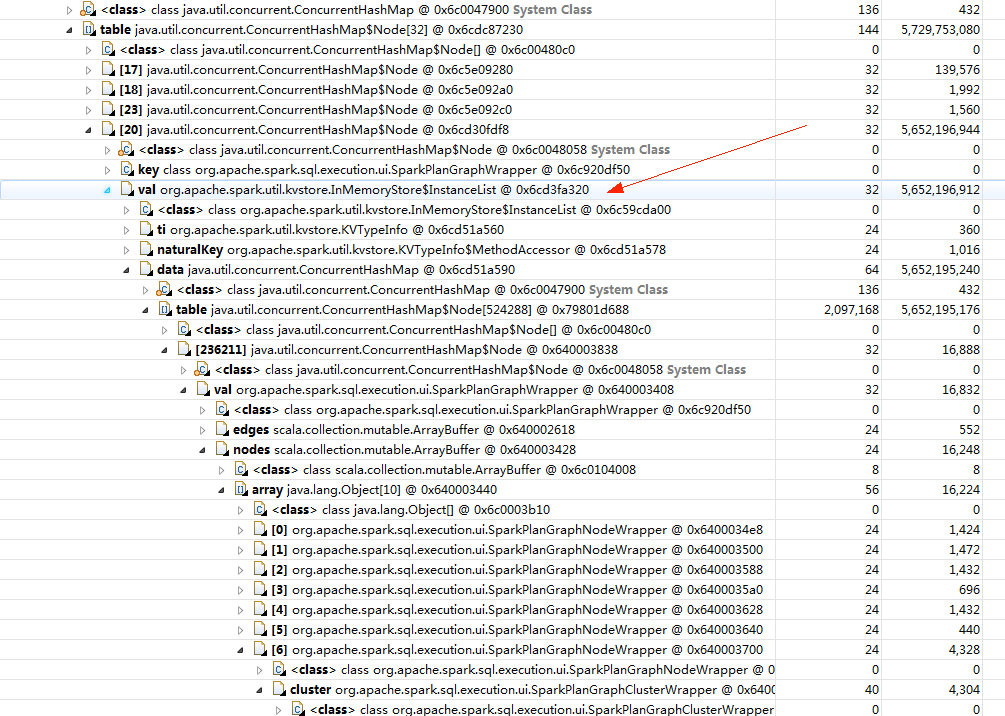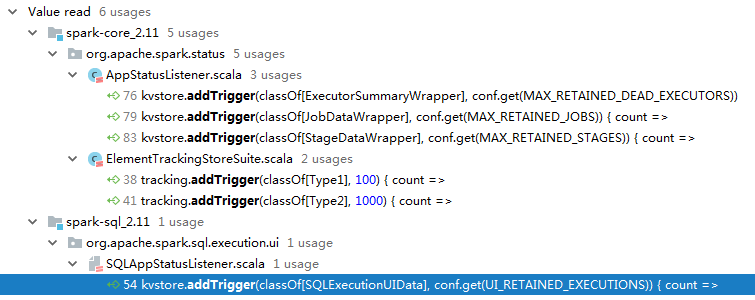长话短说,我们部门一个同事找到我,说他的spark 2.3 structured streaming程序频繁报OOM,从来没有坚持过超过三四天的,叫帮看一下。
这种事情一般我是不愿意看的,因为大部分情况下spark oom就那么几种可能:
数据量拉太大,executor内存爆了;
shuffle过程中数据量太大,shuffle数太少,内存又爆了;
闲着蛋疼调用collect之类的方法,把数据往dirver上一聚合,driver内存爆了
闲着蛋疼又调用了一下persist还把结果存内存,还是爆了
这些问题基本都可以通过限制每次拉取的数据/加大内存/该分片分片解决。
但这次这个我看了一下,还真不是上面这些日常问题,值得记录一下。
过程过了一遍程序和数据,肉眼感觉没毛病,这些地方都没问题,只好祭出大杀器:
-XX:+HeapDumpOnOutOfMemoryError顺便还加上了printGC全家桶。
程序再次挂掉后,先看了一眼gc日志,发现老年代内存使用量持续增大,fgc前后几乎无变化,那么就不是数据太大装不下,应该是内存泄漏没跑了,再看dump文件。
拿MAT打开文件,很容易就定位到了内存泄漏点,如下图所示:

直奔源码: public class InMemoryStore implements KVStore { private Object metadata; //这里就是那个5个多g大的map private ConcurrentMap<Class<?>, InstanceList> data = new ConcurrentHashMap<>(); ...... }
没毛病,能对上。所以问题应该比较清晰了,spark应该是每次执行batch时在什么地方往这个map里加了很多数据,但是又忘记了移除掉已经过期的部分,所以导致gc无效了。
那接下来要问的就是,什么地方做了put操作而又没有remove呢?我们再来看看下这个5个g的InmemoryStore的引用到底被谁持有:

图里很明显,接下来我们要看ElementTrackingStore的实现,我顺便把这个类的说明也放在这里:
/** * A KVStore wrapper that allows tracking the number of elements of specific types, and triggering * actions once they reach a threshold. This allows writers, for example, to control how much data * is stored by potentially deleting old data as new data is added. * * This store is used when populating data either from a live UI or an event log. On top of firing * triggers when elements reach a certain threshold, it provides two extra bits of functionality: * * - a generic worker thread that can be used to run expensive tasks asynchronously; the tasks can * be configured to run on the calling thread when more determinism is desired (e.g. unit tests). * - a generic flush mechanism so that listeners can be notified about when they should flush * internal state to the store (e.g. after the SHS finishes parsing an event log). * * The configured triggers are run on a separate thread by default; they can be forced to run on * the calling thread by setting the `ASYNC_TRACKING_ENABLED` configuration to `false`. */ private[spark] class ElementTrackingStore(store: KVStore, conf: SparkConf) extends KVStore { import config._ private val triggers = new HashMap[Class[_], Seq[Trigger[_]]]() private val flushTriggers = new ListBuffer[() => Unit]() private val executor = if (conf.get(ASYNC_TRACKING_ENABLED)) { ThreadUtils.newDaemonSingleThreadExecutor("element-tracking-store-worker") } else { MoreExecutors.sameThreadExecutor() } @volatile private var stopped = false /** * Register a trigger that will be fired once the number of elements of a given type reaches * the given threshold. * * @param klass The type to monitor. * @param threshold The number of elements that should trigger the action. * @param action Action to run when the threshold is reached; takes as a parameter the number * of elements of the registered type currently known to be in the store. */ def addTrigger(klass: Class[_], threshold: Long)(action: Long => Unit): Unit = { val existing = triggers.getOrElse(klass, Seq()) triggers(klass) = existing :+ Trigger(threshold, action) } ...... }这个类的方法里,我们需要关注的就是这个addTrigger方法,其注释也写的很明白,就是用来当保存的对象达到一定数目后触发的操作。
这时候心里就猜一下是不是什么地方的trigger写错了,所以我们再看看这个方法都在哪里使用了:

考虑到我们溢出的对象都是SparkPlanGraphNode,所以先看最下面我选中的蓝色那一行的代码: kvstore.addTrigger(classOf[SQLExecutionUIData], conf.get(UI_RETAINED_EXECUTIONS)) { count => cleanupExecutions(count) } private def cleanupExecutions(count: Long): Unit = { val countToDelete = count - conf.get(UI_RETAINED_EXECUTIONS) if (countToDelete <= 0) { return } val view = kvstore.view(classOf[SQLExecutionUIData]).index("completionTime").first(0L) val toDelete = KVUtils.viewToSeq(view, countToDelete.toInt)(_.completionTime.isDefined) //出错的就是这一行 toDelete.foreach { e => kvstore.delete(e.getClass(), e.executionId) } }
看到了吧,这里在触发trigger的时候,压根没有删除SparkPlanGraphWrapper的相关逻辑,难怪会报oom!
结果
